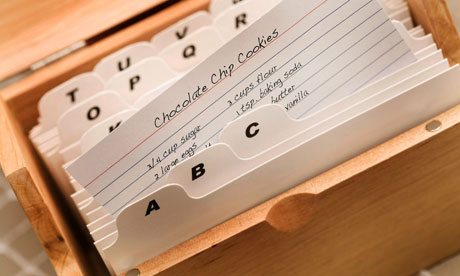
Online and on paper, there are myriad methods for keeping your recipes organised and under control. But do any of them offer a complete and foolproof solution? New website ForkChop lets you store recipes from various websites and enter your own. The clever part is that it also keeps track of any edits you make to ingredients and method, which is great for perpetual recipe tweakers like me. It also has space for notes, like virtual scribbles on a cookbook margin. Of course, if the recipes you want to store don't come from the 20 websites ForkChop links with then you have to type them in yourself. Too much faff for me, but a nice idea.
Delicious is a popular choice for storing links, but it's lacking on the editability front. And there's the question of what to do with the newspaper and magazine cuttings, supermarket recipe cards (does anyone ever actually cook from them?) and hand written scraps passed down from your granny. I have folders, but they're overflowing and chaotic. Some people stick paper recipes into scrapbooks, something for which I have a fluctuating level of enthusiasm. People love to give me blank recipe notebooks for Christmas, and I've now got at least a dozen half-filled. The moleskine is my favourite, but remains sadly underused.
The main problem is that I rarely go back and look at any of these notebooks or folders, let alone cook from them. There's just too much information and it takes far too long to find anything. This doesn't stop me hoarding yet more recipes, of course.
Then there are the cookbooks. I tried to catalogue my collection once. Its pages are peppered with Post-it notes marking tempting dishes. Green for vegetarian, pink for baking, blue for, hmmm, can't remember. It hasn't helped. If I don't try a recipe out straight away on reading the book then it's lost forever. I think this is why I love Hugh Fearnley-Whittingstall's River Cottage Fish Book, Jane Grigson's Fruit Book and others like them. Single subject volumes have done half the work for me already and I know just where to look when I want to rustle up a dab in a bap or an orange syrup cake.
A website that might help ease my cookbook woes is Eat Your Books, a nifty site that indexes books online. It makes cookbooks fully searchable and gives you the reliability of trusted tomes paired with the easy search power of the web. With 100,000 books in the archive, it's pretty comprehensive, and if your favourite book isn't indexed you can put in a request or do it yourself. It does come at a cost though: $25 for a year's unlimited access.
At the moment I'm experimenting with a combination of old school and online. As I cook recipes from my mountain of cuttings I've started to take photos of them with my phone and uploading them to Evernote. It's not a recipe system as such, but an organisational tool that productivity junkies swear by. Photos and videos sit happily alongside weblinks and text files. It syncs between my phone and laptop, and it's free.
Will it solve my recipe storage problems? That remains to be seen. After all, you know what they say about workmen and their tools.

